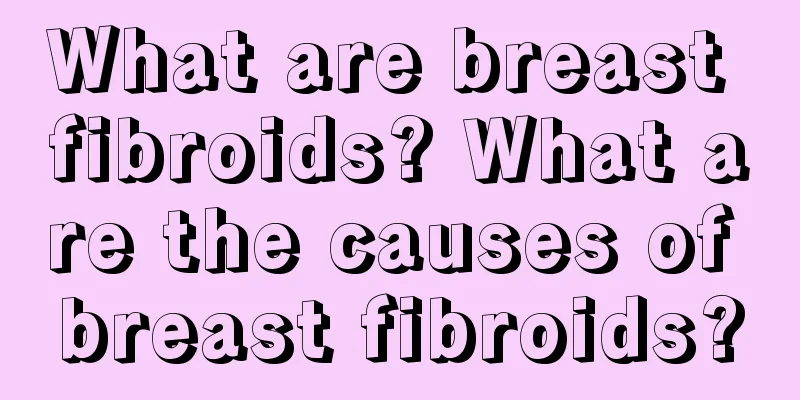What are breast fibroids? What are the causes of breast fibroids?

|
In recent years, breast diseases in women have become more and more common, and people have become more and more concerned about breast health and other related issues. Breast fibroids are a type of breast disease that poses a serious threat to women's health, but many female friends still don't know much about it. So what exactly are breast fibroids? What are breast fibroids? Breast fibroadenoma is a benign tumor composed of a mixture of glandular epithelium and fibrous tissue. It is common in young women and is related to an imbalance in sex hormone levels in the patient's body. This disease is also known as adenofibroma and adenoma, which is due to the different degrees of fibrous components and glandular epithelial hyperplasia that make up the tumor. What are the causes of breast fibroids? 1. Imbalance of estrogen levels If the estrogen level is relatively or absolutely elevated, excessive estrogen stimulation can lead to abnormal proliferation of the breast duct epithelium and stromal components to form tumors. 2. Childbirth and breastfeeding Clinical studies have shown that the occurrence of breast fibroids is closely related to childbirth and breastfeeding. Women who have not given birth or are breastfeeding have a higher chance of developing breast fibroids than ordinary women. 3. Endocrine disorders Clinically, breast fibroadenomas generally occur in women between the ages of 20 and 30. During this age period, estrogen levels in women are at their highest normal levels. If they consume foods high in hormones, it will lead to an increase in stimulants in the body and endocrine disorders, thus triggering the occurrence of breast fibroadenomas. 4. Genetic predisposition There are multiple cases of hereditary breast fibroids in clinical practice. What are the symptoms of breast fibroids? 1. The most common clinical manifestation of breast fibroadenoma is breast lump. In most cases, breast lump is the only symptom of the disease. 2. The lumps of breast fibroadenoma are more common in the upper outer quadrant of the breast. 3. The lumps of breast fibroadenoma are usually not accompanied by pain and do not change with the menstrual cycle. 4. Adenomas are usually solitary, but may also be multiple. Adenomas are round or oval in shape, with a diameter of 1 to 3 cm being more common, but there are also smaller or larger ones, and occasionally huge ones. 5. The surface is smooth, the texture is firm, the boundaries are clear, there is no adhesion to the skin and surrounding structures, it has a large range of motion, and it feels sliding when touched. 6. There is no swelling of axillary lymph nodes. Adenomas are usually painless and non-tender. Its size and characteristics generally do not change with the menstrual cycle. |
<<: These are all you need to remove scars, they are more effective than medicine
>>: Laparoscopic ovarian cystectomy, do you know what it is?
Recommend
How to judge whether the flow is clean
In today's society, unmarried pregnancies are...
How is the tropical rainforest valley? How many species of plants are there in the Yanoda tropical rainforest?
my country's tropical rainforest resources ar...
How to prevent calf cramps in pregnant women
Calf cramps in pregnant women are quite common du...
A woman has a hard lump below
The private parts are an important part of the fe...
What are the symptoms of menopausal syndrome in women?
When it comes to menopause, it’s not just the men...
Bilateral adnexal cysts with clear borders of anechoic areas
The boundaries of the echo-free areas of bilatera...
Why can't I collect Douyin diamond cards? The probability of collecting Douyin cards and Douyin diamond cards in 2020
The 2020 Douyin Get Rich Chinese New Year card co...
Women's sterilization surgery
The most traditional form of contraception is for...
Surgical treatment of breast calcification
The problem of breast calcification is quite seri...
What should I do if I have sex five days after an abortion?
There is a long recovery period after an artifici...
How to calculate 28 days of menstruation
In fact, many people do not have a clear understa...
Mycoplasma positive in gynecological examination
During a gynecological examination, if mycoplasma...
How long does it take for the gestational sac to rot?
During pregnancy, pregnant women should pay atten...
Itchy lower body, delayed menstruation
Vulvar itching is a condition caused by certain g...
Does body temperature rise during menstruation?
The problem of temperature changes during menstru...









